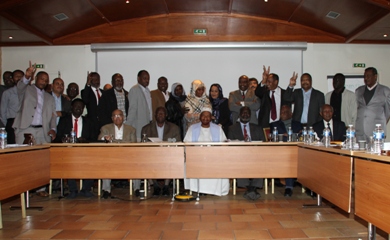Germany to host meeting of the Sudanese opposition: Arman
January 12, 2016 (KHARTOUM) – Secretary General of the rebel Sudanese People’s Liberation Movement/North (SPLM-N) Yasser Arman has disclosed moves by Germany to host a meeting for the Sudanese opposition in Berlin to discuss the pre-dialogue meeting.

It is worth to mention that Germany had signed a strategic partnership agreement with the AU High Implementation Panel (AUHIP) by the end of 2014 allowing it to work with the Sudanese parties to facilitate a process aiming to bring peace and achieve democratic transformation in the east African country.
Thanks to the German efforts, Sudanese opposition holdout groups, in a meeting held in Berlin last February, declared their readiness to participate the national dialogue preparatory meeting despite their previous reserves.
Arman pointed out that the proposed German meeting would include the RNM leader Ghazi al-Attabani who is a signatory of the Addis Ababa agreement.
Khartoum had previously refused to participate in a comprehensive preparatory meeting including the political opposition and civil society groups. Only it reiterated its readiness to meet the rebels to discuss the conditions and guarantees related to their participation in the internal process.
However, the Sudanese president Omer al-Bashir last October instructed the dialogue body known as 7+7 to meet with the signatories of Addis Ababa agreement including the Sudanese Revolutionary Front (SRF) and the National Umma Party (NUP).
The SRF and the NUP from one side and 7+7 committee from the other side on 5 September 2014 signed an agreement on identical term with the AUHIP “on the national dialogue and constitutional process”.
At the time, al-Attabani signed the agreement on behalf of the 7+7 committee but his party later withdrew from the national dialogue and since then the government refused his participation in the pre-dialogue meeting.
SPLM-N secretary general expected the AUHIP would submit its annual report and new plan to the AU Peace and Security Council (AUPSC) on January 20th, saying the latter would most likely renew its mandate to continue mediation efforts in Sudan.
“Important regional and international powers have developed new ideas and contacted [the mediation] asking them to take into consideration the latest developments and the new players such as Saudi Arabia,” he said.
Arman added in his message that the AUHIP chief Thabo Mbeke sought to hold the pre-dialogue meeting before he submits his new plan to the AUPSC on January 20th so as to test the will of the various dialogue parties but said that was no longer possible.
He stressed that it is not in the interest of the “forces of change” to keep the current African, regional and international stances, saying this would serve the interests of the regime.
“The internal [opposition] fronts constitute the foundation [for the opposition work] and the major factor to impact on the outside [world] however, it is important to develop a strategy for external action,” he said.
“The world is changing and we all know that opposition work [can’t be carried out] the same way as we did in the seventies, eighties and nineties [of the twentieth century] ,” he added.
Some opposition parties inside the country refuse to join the dialgue process despite the regional and international efforts to convince them to change their mind. They say they plan to mobilize the street and bring down the regime through a popular uprising like what they did in 1964 and 1985.
Regarding the upcoming informal talks between the government and the SPLM-N, Arman said they would take advantage of any opportunity to arrive at an equitable dialogue leading to a comprehensive peaceful solution and allowing for delivering humanitarian assistance besides ending the war and allowing freedoms.
“Our negotiating team would be resilient enough to achieve those objectives and it wouldn’t abandon the joint goal of [achieving] the comprehensive solution and the equitable dialogue in order to arrive at a political settlement within the framework of a credible political process,” he said.
He expressed readiness to hold more consultations with the political and civil society forces on the issues under discussion in order to develop the joint stances to address the new developments.
DARFUR TRACK
Meanwhile, SPLM-N secretary general welcomed ongoing efforts to achieve a solution on the Darfur track, noting they are aware of moves to hold informal discussions between the government and Darfur movements either in Addis Ababa or Berlin.
“We welcome those efforts and we had previously asked the Sudanese government to hold the [informal talks] on both tracks because the war must stop simultaneously,” he said
The Qatari Deputy Prime Minister Ahmed bin Abdallah al-Mahmoud Monday has discussed with leaders of the Justice and Equality Movement (JEM) Gibril Ibrahim and the Sudan Liberation Movement (SLM-MM) Minni Minnawi ways to achieve peace in Darfur.
Doha brokered the Darfur peace negotiations which resulted in the signing of the Doha Document for Peace in Darfur (DDPD) by the Sudanese government and the Liberation and Justice Movement (LJM) in July 2011.
In April 2013, a dissident faction of the Justice and Equality Movement (JEM) joined the DDPD while the main Darfur rebel movements abstained.
The latest round of talks last November between the Sudanese government and the JEM and SLM-MM have stalled over issues pertaining to the security, humanitarian and political arrangements.
Darfur rebel groups demand to hold talks on Darfur conflict and to open the DDPD for discussion before to join the national dialogue process.
Earlier this month, the Sudanese government said it has received an invitation from AU to participate in an informal meeting with two Darfur rebel movements in Addis Ababa.
(ST)
